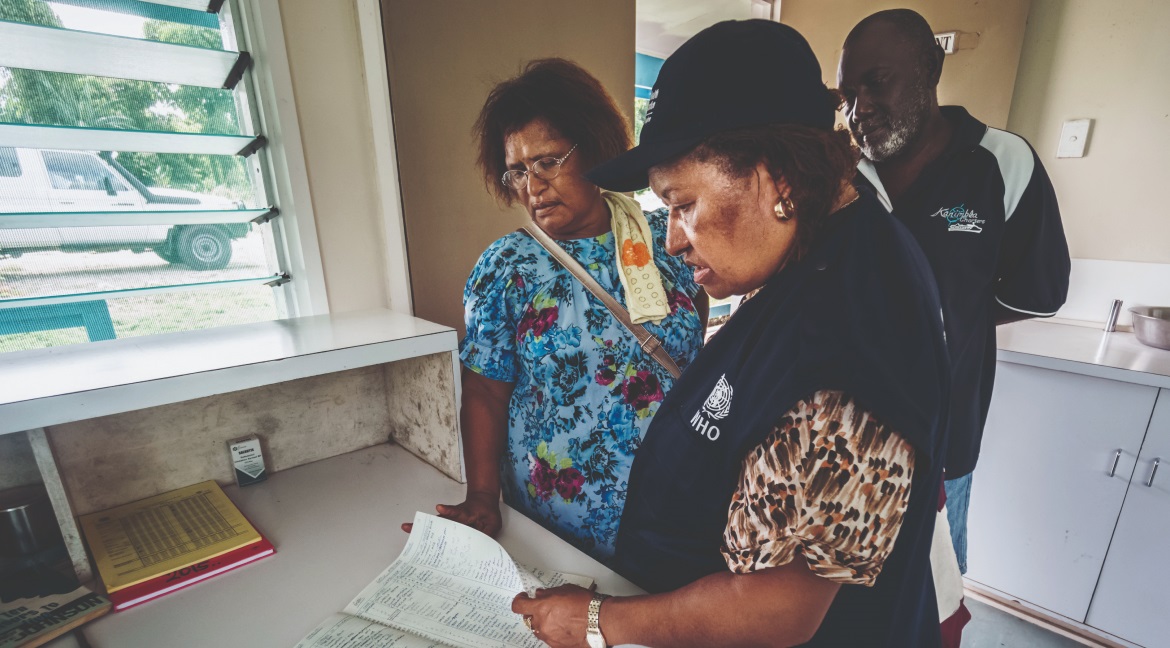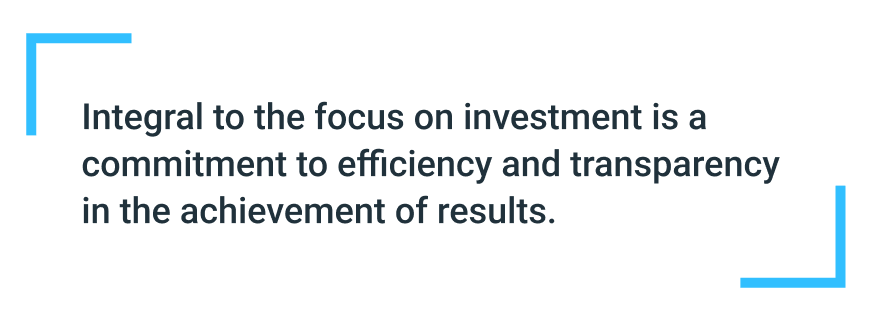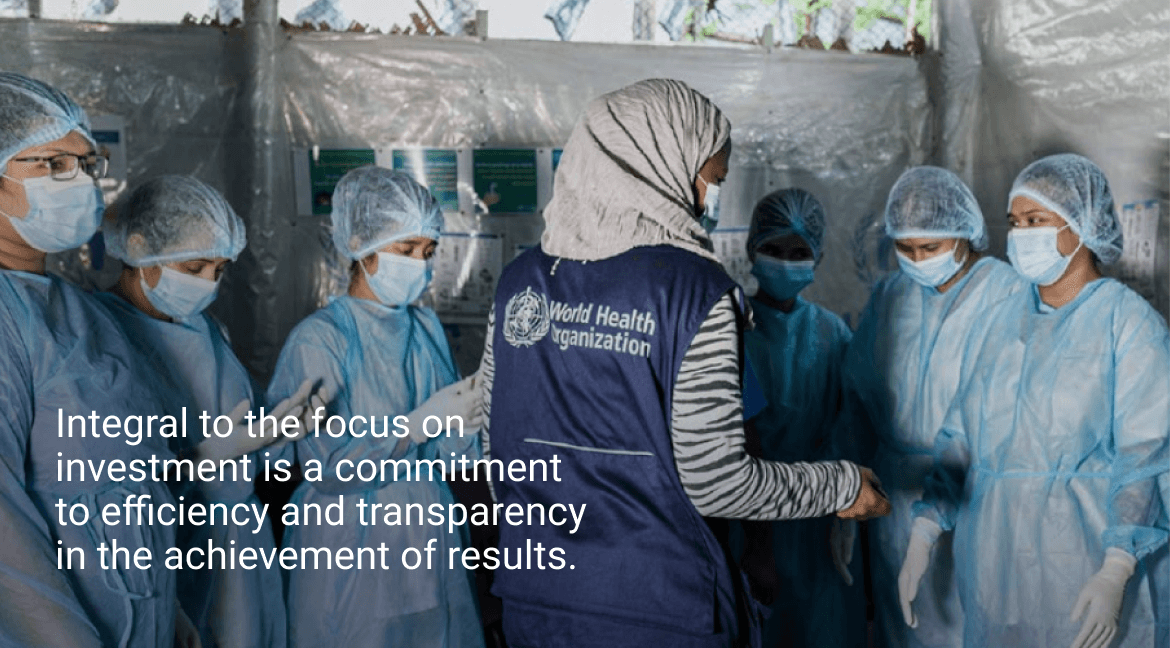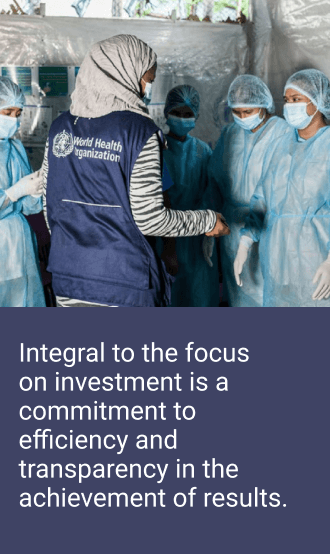
Chapter 4
WHO’s Thirteenth General Programme of Work
WHO’s Thirteenth General Programme of Work
Measurable impact is at the core of WHO’s mission to promote health, keep the world safe, and serve the vulnerable. This focus on impact on people’s health in all countries is reflected in the Thirteenth General Programme of Work, 2019–2023.1
The Programme’s Triple Billion targets (one billion more people benefitting from universal health coverage, one billion more people better protected from health emergencies, and one billion more people enjoying better health and well-being by 2023) provide a unified approach to accelerating progress towards the achievement of the health-related Sustainable Development Goals. WHO’s Triple Billion targets are fundamentally interconnected. As the COVID-19 pandemic has shown, healthier, more resilient societies can respond more effectively to health emergencies. Essential health services must be available to all, because if not, disease spreads along the fault lines of social inequality. Whole-of-society approaches are needed to health, with a corresponding commitment to global solidarity, in order to secure the essential public goods of effective health systems and life-saving commodities.

Although WHO has focused on coordinating and supporting the response to the pandemic and other emergencies globally, regionally and nationally, the Secretariat has continued to implement most of the operational plans agreed in its current General Programme of Work to improve health, build resilient systems and protect populations, especially the most vulnerable, from emergencies.2
The current rate of progress towards achieving the Triple Billion targets is suboptimal. The world is expected to reach an additional 270 million people with universal health coverage – access to services without financial hardship– by 2023.3 This figure represents a significant shortfall of 730 million people to meet the universal health coverage billion target by 2023, with COVID-19 expected to have increased this gap to 800–840 million people.3 Compared with the baseline value of 2018, almost one billion more people were projected to be better protected from health emergencies in 2023, but action towards the target was not sufficiently ambitious to secure the protection required. Moreover, the measurement system needs improvement, as is happening through the development of a dynamic preparedness measure, and universal health and preparedness review.
Before the impact of COVID-19 was taken into account, action on the healthier populations billion target was projected to reach 900 million more people enjoying better health and well-being in 2023 compared with the baseline value of 2018.
This is promising progress, but major inequalities between countries are masked by this overall progress and it leaves a gap of well over two billion people compared with where the world needs to be in 2023 in order to remain on track to achieve the targets for Sustainable Development Goal 3 (Ensure healthy lives and promote well-being for all at all ages). Given the extent to which the world is off track to achieve the Triple Billion targets and the Sustainable Development Goals, the recommended extension of the Thirteenth General Programme of Work to 20254 should enable rapid and sustained efforts to overcome the setbacks resulting from the COVID-19 pandemic, and to consolidate progress as well as fill gaps in achieving the targets.
To give greater impetus to WHO in carrying out its core functions, the Thirteenth General Programme of Work sets out three strategic shifts: stepping up leadership, driving public health impact in every country, and focusing global public goods on impact. These strategic shifts are integral to the ongoing transformation of WHO, which continues to improve the Organization’s efficiency, effectiveness and ability to fulfil its mission.



Integral to the focus on investment is a commitment to efficiency and transparency in the achievement of results. Associated with the Thirteenth General Programme of Work, new measurement tools and mechanisms to become data driven and demonstrate WHO's accountability for results have been rolled out. They include the redesign of the programme budget process to make it more bottom up and outcome-focused, improved visibility of funds received through a web portal, a results framework developed with Member States and using a balanced scorecard approach, and regular "delivery stocktakes" that track progress towards the Triple Billion targets and the Sustainable Development Goals, as well as annual results reports to provide greater accountability for results.
- Thirteenth General Programme of Work, 2019–2023: promote health, keep the world safe, serve the vulnerable. Geneva: World Health Organization; 2019 (WHO/PRP/18.1; https://apps.who.int/iris/handle/10665/324775/).
- Executive summary, results report, Programme budget 2020–2021 (mid-term). Geneva: World Health Organization; 2021 ( https://www.who.int/publications/m/item/executive-summary-who-results-report-programme-budget-2020-2021-mid-term-review, accessed 17 March 2022).
- Triple Billion dashboard. Geneva: World Health Organization; 2022 ( https://www.who.int/data/triple-billion-dashboard, accessed 17 March 2022).
- In resolution EB150.R4, WHO’s Executive Board recommended that the Seventy-fifth World Health Assembly in May 2022 extend the endpoint of the Thirteenth General Programme of Work by two years from 2023 to 2025.
